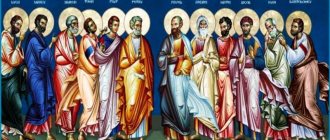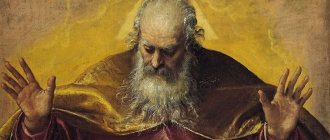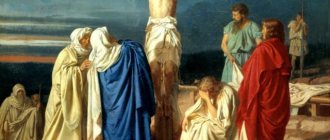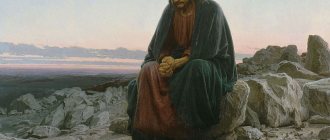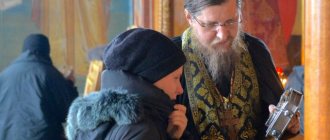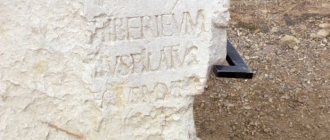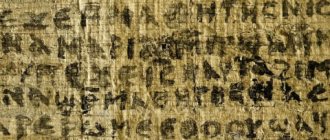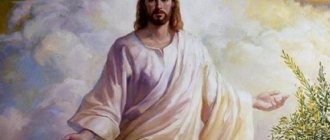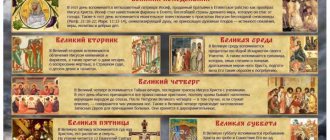Content
Saint Mark wrote his Gospel for pagan Christians, so he dwells primarily on the speeches and deeds of the Savior, in which His Divine omnipotence is especially manifested. Many features of his narrative can be explained by his closeness to the Apostle Peter. All ancient writers testify that the Gospel of Mark is a brief record of the sermon and stories of the chief apostle. One of the central theological themes in the Gospel of St. Mark is the theme of the power of God accomplished in human weakness, for the Lord makes possible what is impossible for people. Under the action of Christ (Mark 16:20) and the Holy Spirit (Mark 13:11), his disciples go throughout the world and preach the Gospel to every creature (Mark 13:10; Mark 16:15).
The author of the Gospel is considered to be Mark, an apostle from 70
The true authorship of the Gospel of Mark has not been established. The Gospel itself does not contain information about the author.
In the Bible, a man named Mark is mentioned in several places:
- In the second letter to Timothy:
(2 Tim. 4:11)
Take Mark and bring him with you, for I need him for service.
- In the Acts of the Apostles:
(Acts 12:12)
And having looked around, he came to the house of Mary, the mother of John, called Mark, where many were gathered and praying
(Acts 12:25)
And Barnabas and Saul, having completed their assignment, returned from Jerusalem [to Antioch], taking with them John, called Mark
(Acts 15:37)
Barnabas wanted to take with him John, called Mark
- In the Epistle to the Colossians:
(Colossians 4:10)
Aristarchus, imprisoned with me, and Mark, nephew of Barnabas, greet you.
- In the Epistle to Philemon:
(Phil. 1:23-24)
Epaphras, a prisoner with me for the sake of Christ Jesus, greets you, Mark, Aristarchus, Demas, Luke, my colleagues
5. In 1 Peter:
(1 Peter 5:13)
The church chosen like you in Babylon greets you and Mark my son
How all these people relate to each other, whether it is one person or several, is not completely clear. Hippolytus of Rome believed that these were all different people. The later church tradition, and after it modern researchers, are of the opinion that this is still one and the same person.
Mark was “appointed” as evangelist by St. Papias of Hierapolis. Eusebius of Caesarea quotes excerpts from works that have not reached us:
Mark, the interpreter of the Apostle Peter, wrote down the words and deeds of Jesus with accuracy, but not in order.
The Apostle Mark wrote the Gospel and became the first bishop of Alexandria.
Having collected all the information about all the Marks, we will get a more or less coherent biography. Here is its summary:
Apostle Mark was born in Jerusalem. Converted to Christianity. Christ included him among the 70 apostles and sent him to preach the Word of God. After the Crucifixion and Resurrection, he organized meetings of Christians in his home. He was a close associate of the apostles Peter and Paul, and preached with Paul and Barnabas in Cyprus.
From Cyprus he returned to Jerusalem, then went to Egypt and founded a bishopric in Alexandria. Travels to Rome with the Apostle Paul. During Paul's imprisonment in Rome, he writes the Gospel, and then returns to Alexandria. In Alexandria, the apostle suffered martyrdom at the hands of the pagans.
The Lord did not allow his disciple to be violated: the pagans wanted to burn the body, but the Lord showed a miracle: he caused an earthquake. The pagans fled in horror, and the Apostle Mark was buried as it should be.
A church was built over the relics. After the conquest of Egypt by the Arabs, the relics were transported to Venice, where they are kept to this day.
The lion, the symbol of Mark the Evangelist, became the coat of arms of Venice
Peculiarities
Although this Gospel does not say anything new at all, except for what we already find in Matthew and Luke, only repeating it often in a shorter form and often releasing long speeches that were recorded by other evangelists, we still cannot look at it , as a repetition of other Gospels, since in all other respects it shows the character of an independent work. Many minor details, which are found only here, indicate that, although the author sets out pre-existing stories about the Lord, he received information from an observant eyewitness who had a good memory. The personality of Christ in all actions and attitude towards the environment appears more clearly here than anywhere else. Here we are told that Christ took Peter’s mother-in-law by the hand and raised her up (Mark 1:31), that He took the demoniac by the hand and lifted him up (Mark 9:27), etc. Only here it is written that He “looked” at the rich young man and loved him, and that He “looked around” and spoke to His disciples (Mark 10:21,23), etc. [1]. Further, the Savior’s tirelessness in His ministry is described here: how He got up early before dawn to pray (Mark 1:35), how He even had no time to eat bread (Mark 3:20; Mark 6:31), how His , tired with work, the disciples took Him into the boat, where He slept at the stern, at the head 4:36 and gave. — we find all these details only in the Gospel of Mark. Notice how He “marveled at the unbelief” of the people (Mark 6:6), and how He “sighed deeply” at their plight (Mark 7:34; Mark 8:12). The word “immediately,” which speaks of haste and responsiveness, appears more often in this book than anywhere else in the Bible. See Mk. 1:10,12,20,21, etc. In the entire New Testament it occurs about 80 times and of this number more than 40 times in the Gospel of Mark. With these and many other similar features, the Gospel of Mark aims to portray Christ as the faithful Servant of God, whose amazing life and works served as the basis of the gospel narrative. What makes Mark special is that he calls Jesus “the carpenter” (Mark 6:3).
Chapter 1
Read in the week before Enlightenment (Epiphany) and at the third hour on the eve of Epiphany (Epiphany)
Mark 1:1. The beginning of the Gospel of Jesus Christ, the Son of God,
Gospel
, from Greek - gospel.
that is, the joyful news about the Redeemer who came into the world and about the establishment by Him of His grace-filled kingdom (See Matt. 3:2 ff.). The beginning of the Gospel
.
Evangelist Matthew began his Gospel with the genealogy and history of the very birth of Christ; Evangelist Mark omits all this and begins with the appearance of the Forerunner's sermon about Christ the Savior - from the event with which the Gospel actually began, i.e. the gospel of the coming Savior and His kingdom. Jesus Christ
.
Jesus means Savior. This is the name of the Son of God, the Redeemer of the human race, named, by the command of God, by an Angel even before the birth of the Savior on earth (Matt. 1:21; Luke 1:31). It is quite common among Jews and means: God the Savior or, simply, the Savior. To save people from eternal destruction for sins that began in the human race with the fall of our ancestors in paradise, according to the wise Divine plans, the Son of God, the second person, had to come down from heaven to earth, become incarnate and, having taken upon himself the sins of the human race, suffer for them Holy Trinity. And this incarnate Son of God was named at birth Jesus
, that is,
Savior
, and also
Christ
.
Christ in Greek means anointed, in Hebrew Messiah
(Mashiach).
Among the Jews, kings, high priests, and sometimes prophets were anointed with oil, which is why they were called anointed. Through anointing, the consecration of these persons was accomplished, each to his own ministry, and through it, the special gifts of God were usually communicated to those anointed to help them carry out their ministry in a worthy manner. This is how Aaron the High Priest (Ex. 28:41), kings Saul and David (1 Samuel 10:1, 16:13), and the prophet Elisha (1 Kings 19:16) were anointed. The Son of God is called the Messiah or Christ, that is, the anointed one, because the gifts of the Holy Spirit were immeasurably communicated to His humanity, such as the holiness of the high priest, the power of the king and the knowledge of the Prophet. Regarding the name Jesus
, our so-called schismatics, that is, persons who arbitrarily separated from the true church because of certain church rituals, fall into error and argue a lot.
They teach that one should write and speak not Jesus
, but
Jesus
.
But it is Jesus
(Ιησγς) the Greek word or
Yeshua,
the abbreviated
Yehoshua,
the Hebrew word that means Savior, and not Jesus, there is no such word in the Greek language.
If Jesus
, it is written abbreviated, as they often wrote in ancient times.
This name was also written with two letters Isa. (See Matthew 1:1). Son of God
.
Evangelist Matthew, who wrote his Gospel for Jewish Christians, says: Son of David, Son of Abraham
, to show the origin of the Savior in the flesh from the forefathers of the Jewish people, while Mark, who wrote the Gospel for Gentile Christians, says:
Son of God
, to draw attention to this these Christians to the main person of their gospel, who is not a simple, even a great man, but the Son of God, in the proper sense, to whom is due all glory, honor and worship and who therefore deserves complete unconditional faith in Him (Mic.).
Mark 1:2. as it is written in the prophets: Behold, I send My angel before Thy face, who will prepare Thy way before Thee. (Mal.3:1).
Mark 1:3. The voice of one crying in the wilderness: prepare the way of the Lord, make his paths straight (Is. 40:3).
Prophets
- these are special, pious people in the ancient Jewish people whom the Lord sent to reveal His will to people and filled them with the Holy Spirit so that they could predict the future (2 Pet. 1:21).
From the prophets
.
The Evangelist follows this with the prediction of the two Jewish prophets Malachi and Isaiah. Behold,
I (here I am)
send My Angel before Your face, who will prepare
(who will prepare)
Your way before You
.
These are the words of the prophet Malachi about John the Baptist (Mal.3:1), they were attributed to the Forerunner by the Lord Jesus Christ Himself (Matthew 11:10). John is called an Angel for his seemingly angelic, almost ethereal life and for his announcement and indication of the coming Christ. John prepared the way of the Lord by preparing the Jews to receive the Messiah through his preaching and baptism. The voice of one crying in the wilderness
, etc. These are the words of the prophet Isaiah about John the Baptist (Is. 40:3), John himself refers to them (John 1:23).
In these words, the Lord means the Messiah, Jesus Christ, who appeared to free people from the captivity of sin, curse and death, similar, for example, to the liberation of the Jews from Babylonian captivity; under the messenger is John the Baptist, who foreshadowed the coming of Christ and prepared the Jews to receive Him as their King, their Messiah. Expressions: I am sending My Angel, who will prepare Your way
, and
the voice of one crying in the wilderness, prepare the way of the Lord, make
His
paths
(make right) taken from the custom, when the king, leading an army and being on a campaign, sent ahead messengers to announce his approach, prepare everything necessary for him and build roads.
Prepare the way for the Lord
, that is, be prepared for a new grace-filled life according to the commandments of the Lord - the Savior;
make His paths straight
, that is, understand the Old Testament law not by its letter, but by its spirit - by its inner spiritual meaning. (See explained. Matthew 3:3.).
Mark 1:4. John appeared, baptizing in the wilderness and preaching a baptism of repentance for the forgiveness of sins.
About the appearance and preaching of the Forerunner, as well as further about the Baptism of the Lord Jesus Christ by St. Mark tells the story completely in accordance with St. Matthew, only shorter (Matthew 3:1-12). John appeared baptizing in the desert
... John was the Forerunner of Christ.
He prepared the Jewish people with his preaching to accept the Savior. The prophets Isaiah (Isaiah 40:3) and Malachi (Malachi 3:1) predicted His appearance and appointment. His very conception and birth were foretold to his father Zechariah in the temple by the Archangel Gabriel and the first was connected with the father’s muteness for disbelief in the Archangel, and the second - by the opening of the mouth and a prophecy both about the Savior Himself and about His Forerunner, the newborn son of Zechariah (Luke 1 ). In John’s infancy, as the legend tells, when, fleeing from the persecution of King Herod, who beat infants in Bethlehem, his mother Elizabeth fled with him into the desert and soon died there, an Angel nourished and protected him. When he reached the age of thirty, the age of full maturity, he received a voice from the Lord to begin preaching about the Messiah. John the Baptist was a relative of Christ; his mother Elizabeth was the cousin of the Most Holy One. Mother of God (Cyr. Alex.), - and was six months older than Christ (Luke 1:26). John was a great ascetic who lived in the desert
;
there he preached
, and there
he baptized.
Baptism is immersion, washing in water.
Among the Jews, in some cases, washing was a religious rite (Ex. 19:10; 29:4, etc.) and meant, in addition to bodily purity, the cleansing of the soul, that is, the remission of sins and renewal of life. The baptism of John by immersion in the river, which was preceded by confession of sins
(Mark 1:5), - which is why it is called
the baptism of repentance
- was an action completely different from ordinary Jewish cleansing, new, preparing for the acceptance of the Redeemer of the world, Jesus Christ.
It did not have the power to forgive sins, but indicated only that the time was coming when the Savior would grant remission of sins
(Mark 1:1);
so that those who were baptized with the baptism of John were subsequently to be baptized with the baptism of Christ (Acts 19:3-5). The Forerunner preached baptism of repentance, writes Blessed. Theophylact, so that people would repent and, having accepted Christ, receive remission of sins. John preached and baptized in the desert. The Evangelist Matthew says in the desert of Judea
(Matthew 3:1).
Such a desert was called in the Land of Judea, or Palestine, where our Lord our Savior was born and lived, an area several miles west of the Dead Sea, crossed by mountains and several rivers. The word desert in St. Scripture does not mean an area completely devoid of inhabitants, but a sparsely inhabited area. There were also villages in the Jordanian desert (Mic.). To this day, they still point out, several miles from the city of Bethlehem, in the wilderness, the cave where John lived. The Forerunner of Christ chose the desert as a place for preaching, on the one hand, because in cities and villages the Pharisees (read about them in the explanation of v. 22) and other folk teachers could hinder him, and on the other hand, because it was more convenient for listeners , as removed from noise and dispersion (Christ. Tch. 1853). Palestine itself, otherwise called the Holy Land, is located in Asia, on the eastern shore of the Mediterranean Sea. This is the land where the Jewish people lived in ancient times, from whom the Savior came in the flesh. In the time of Christ, Palestine was divided into 4 parts: on the right side of the Jordan River , Galilee, Samaria
and
Judea
, and on the left,
the Transjordanian country
:
Perea
, etc. (See map of Palestine).
This is how one of the spiritual writers (Pevnitsky) describes the appearance of the Forerunner with the first sermon: “We imagine a gathering of people in some place near the Jordan on the occasion of a holiday or something else. In the midst of the conversation, a young man suddenly appears before the company, covered with a camel hair cap and belted with a leather belt (4 tbsp.). The harsh ascetic life gave his young face dryness and paleness. On his forehead there are traces of concentrated labor of thought, in his eyes some special animation shines and is expressed, and on his whole face there is a clear imprint of self-absorption and determination. With a strong, high voice, he begins a strong speech to the assembled society; it is amazed at the unexpectedness of this speech, and it is also amazed at the sight of a man who, God knows from where, has appeared and is so unusual in appearance. His words, full of heavenly holiness and inner energy, are heard like thunder before the congregation; and after this word is gone, the stricken understanding does not suddenly come to its senses... New words sink deeply into the soul of those listening. They begin to ask: who is this strange and apparently great man? The desire to listen to him grows more and more. The prophecy, which had not been heard for a long time in Judea, manifested itself with such power as had never been seen, they say, in the mouth of Elijah, and John became the great herald and leader of a new direction of spiritual life in the Jewish people.” The power of John's word and spirit impressed modern generations, and therefore the entire country of Judea and the people of Jerusalem came out to him and were baptized by him in the Jordan River, confessing their sins
.
Mark 1:5. And all the country of Judea and the people of Jerusalem came out to him; and were baptized by him in the Jordan River, confessing their sins.
The entire Judean country
- a strengthened expression: here the word
all
is used instead of:
many
or
very many
, this is how this word is sometimes used in the Holy Scriptures.
Scripture. Jerusalemites
, i.e. residents of the city of Jerusalem.
Jerusalem is the main city of the Kingdom of Judah, in the southern part of Palestine. Around the time of Christ’s life, its permanent residents were thought to number up to 120,000.
was baptized
from him.
Jordan is the main river
of Palestine
. The Jordan originates in the Lebanon Mountains, north of Palestine, and flows through almost all of Palestine from north to south, and flows into the Dead Sea. Its usual width is 10 fathoms, and its depth is 7 (see map).
For the sensual Jews, it was not enough to preach about repentance in words; it was necessary to imprint this sermon with some outward sign, so that they would remember that they had made a firm promise to leave their previous sins, and, having believed in the coming Messiah, to change their lives, i.e. , like bodily washing, they undertake to constantly cleanse their souls from the impurity of sin. This is why John baptized (Tr. l.). How did John baptize? He did not pour water on the head of the person being baptized, as non-Orthodox icon painters write. The Evangelist John directly says that John performed baptism where there was a lot of water; and the very word baptize
means
to immerse
, not to sprinkle.
The Forerunner himself entered the water with the person being baptized, laid his hand on his head, and demanded that he confess his sins; then he plunged him headlong into the water, telling him to believe in the Messiah coming after him, and then took him to the shore, where the baptized one prayed (ibid.). The Jews of Christ's time were convinced that both the Messiah Himself and His forerunner would baptize (John 1:25). Confessing your sins
.
Confession of sins was also in the Old Testament (Lev. 16:29–30 and further Num. 5:7). It is the need of a repentant heart. Confession, as well as the baptism of John, as noted above, did not have the power to forgive sins, since at that time the Lord Jesus Christ had not yet suffered on the cross for the sins of the human race. John preached only repentance and prepared for the remission of sins, that is, he led to the baptism of Christ, which grants remission of sins (Theoph.). (Read about the meaning of John’s baptism in explanatory articles 4 and 8). The Evangelist Matthew says that when John the Baptist preached the baptism of repentance, he said: the kingdom of heaven is at hand
(Matthew 3:2).
Expressions: the kingdom of heaven
and also
the kingdom of God, the kingdom of Christ
are often found in the books of the New Testament, they mean the kingdom of the Lord Jesus Christ on earth and in heaven, i.e. 1) the so-called
kingdom of grace
on earth in the church of Christ (Mark 9:1 ), where sinner man is given justification before God and reconciliation with Him through the redemptive merits of the Savior Jesus Christ (v. 1).
and 2) as a consequence of this, the kingdom of glory
, or bliss in heaven (Matthew 25:34), - the first, as the beginning, and the second, as the complete completion and end.
The Old Testament prophets predicted a lot about this kingdom (Isa. 11:1-10; Jer. 31:31, etc. Dan. 7:13 et seq.). So that the Jews could better understand the teaching about the spiritual kingdom of Christ, the prophets presented this kingdom to them under the image of the earthly one. Only the Jews understood this prediction about the kingdom of Christ directly in a material, and not in a spiritual, sense; therefore, they represented Messiah as an earthly king who would take possession of the kingdoms on earth and, having freed the Jews from Roman power, would make them kings and rulers of nations (Matthew 2:3). It is clear that to enter the kingdom of Christ, repentance is necessary, which is what the Forerunner of Christ demanded from his listeners. And the Lord Savior Himself began His sermon with the words: repent, for the kingdom of heaven is at hand
(Matthew 4:17).
Mark 1:6. John wore clothes made of camel's hair and a leather belt around his waist, and ate locusts and wild honey.
John wore clothes made of camel's hair
(Be obolchen vlasy velbluzhdi).
It was long, thick and prickly hair, from which in ancient times they made coarse fabric and now in the east poor people and monks make clothes for themselves. He ate
(poisonous)
locusts
and
wild honey
(divy). By locusts we must mean a type of locust, which serves as a very common food in the east for poor people. Some, however, think that locusts are the tops of grass, and others are wild apples (Theoph.). By wild honey we mean the honey of wild bees, which was found in abundance in the rocks and hollows of desert trees (Mic.). This honey tastes very bitter (Afan.). Consequently, both the clothes and food of John the Baptist were ascetic, and as with his speeches he reminded the prophet. Isaiah, so vividly resembled another ancient great prophet Elijah with his harsh ascetic life.
Mark 1:7. And he preached, saying, He who is mightier than I is coming after me, whose sandal strap I am not worthy to stoop down to untie;
Mark 1:8. I baptized you with water, and He will baptize you with the Holy Spirit.
The strongest of me is coming for me
(the mighty one is coming), this is
the Messiah
Jesus Christ, the God-man, who was born and preached 6 months later than John the Baptist and Baptist (Luke 1:26
)
. , untie the strap of His shoes).
In the east, due to the heat, they did not wear the kind of shoes that we wear, but in order to cover the sole of the foot from stones and anything sharp, or from hot sand, etc., they tied a board called a sandal to the sole of the foot. Sandals were made from both wood and leather. When entering a house, sandals were usually taken off, and when leaving, they were put on again. Taking them off and putting them on was the job of lower servants. John’s words: I am unworthy
, etc. mean humility, humiliation before Jesus Christ.
He considers himself unworthy to be the last servant of the Lord. I baptized you
(I baptized you)
with water,
that is, I immersed you in water to signify a good change in thoughts and life, since the baptism of John did not give the grace of God, like the baptism of Christ.
And He will baptize
(the same baptizes)
with the Holy Spirit
. The baptism of Christ will be the Holy Spirit, which means that it will have the internal action of the Holy Spirit on the soul of the baptized - to cleanse it from sins according to the power of Christ’s merits on the cross (John 3:5) and revive it into a holy, saving life. This is the difference between the baptism of Christ and John’s. That is why it was necessary for those who were baptized by John’s baptism to be baptized again by Christ (read explanation, article 4). John's baptism, like his ministry, was preparatory.
